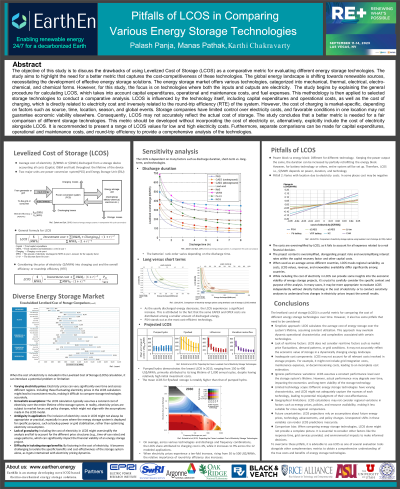Back

Finance and Asset Management
Pitfalls of LCOS in Comparing Various Energy Storage Technologies
Tuesday, September 12, 2023
4:30 PM - 5:30 PM PDT
Location: Poster Area, Booth #11024, Level 1, Venetian Expo Hall

- PP
Palash Panja, n/a
Chief Technology Officer
EarthEn Inc.
Salt Lake City, Utah, United States
Poster Presenter(s)
Proposal information to include, objective, methods, results, and conclusion: One of the key parameters to evaluate an energy storage technology is the Levelized Cost of Storage (LCOS). LCOS is the cost of electricity ($/MWh or $/kWh) discharged from a storage device accounting for all costs (Capital, O&M, and fuel) throughout the lifetime of the device. The objective of this study is to discuss various drawbacks of LCOS in comparing different energy storage technologies and the need for a better metric to capture the cost-competitiveness of the energy storage technologies.
The world is experiencing a paradigm shift from non-renewable to renewable sources of energy. However, 100% dependence on renewable sources such as wind and solar is not possible in absence of long and short-duration energy storage solutions. The energy storage market is extremely fragmented with different solutions for different output (MW) and capacity (MWh). The energy can be stored in mechanical (pumped hydro, flywheel, compressed air), thermal (Underground thermal, molten salt, phase change material, sand, concrete, crushed rock), electrical (superconducting magnet, capacitor), electro-chemical (conventional and flow batteries, hydrogen from electrolysis) and chemical (Hydrogen, synthetic natural gas, gas to liquid) forms. Pumped hydro energy storage (PHES) contributes 96% of global power output (MW) and 99% of global storage capacity (MWh) (Blakers, Stocks et al. 2021, A review of pumped hydro energy storage, Progress in Energy 3(2)).
The output of these storage technologies is not necessarily electricity, for example, thermal storage for direct heating, and hydrogen as a chemical feedstock. Therefore, the focus is given to those technologies where both the inputs and outputs are electricity. One of the important factors in implementing any storage technology is LCOS. Hence, first, a general procedure is discussed to calculate LCOS. Then, the method is applied to the selected storage technologies for a comparison study.
LCOS depends on the technology itself (Capital expenditures and O&M costs) as well as the cost of charging. The cost of charging is directly proportional to electricity cost and inversely proportional to the round-trip efficiency (RTE) of the system. The RTE is technology specific and it can be enhanced by process improvement and optimization. However, the cost of charging is market-specific and it depends on several factors such as source, time of the day, location, season, and global events. The storage company has no/minimum control over this electricity cost. Companies may have advantages for their locations having a free or negative cost of electricity. However, this doesn’t guarantee that the technology is economically viable in any other place on earth. This also doesn’t reflect the actual cost of the storage.
A better metric is required for a fair comparison among different storage technologies. This metric should be developed without incorporating the cost of electricity. Alternatively, the cost of electricity should be shown explicitly along with LCOS and a range of LCOS can be shown for low and high electricity costs. The capital expenditures, O&M costs, and RTE can be compared separately.
The world is experiencing a paradigm shift from non-renewable to renewable sources of energy. However, 100% dependence on renewable sources such as wind and solar is not possible in absence of long and short-duration energy storage solutions. The energy storage market is extremely fragmented with different solutions for different output (MW) and capacity (MWh). The energy can be stored in mechanical (pumped hydro, flywheel, compressed air), thermal (Underground thermal, molten salt, phase change material, sand, concrete, crushed rock), electrical (superconducting magnet, capacitor), electro-chemical (conventional and flow batteries, hydrogen from electrolysis) and chemical (Hydrogen, synthetic natural gas, gas to liquid) forms. Pumped hydro energy storage (PHES) contributes 96% of global power output (MW) and 99% of global storage capacity (MWh) (Blakers, Stocks et al. 2021, A review of pumped hydro energy storage, Progress in Energy 3(2)).
The output of these storage technologies is not necessarily electricity, for example, thermal storage for direct heating, and hydrogen as a chemical feedstock. Therefore, the focus is given to those technologies where both the inputs and outputs are electricity. One of the important factors in implementing any storage technology is LCOS. Hence, first, a general procedure is discussed to calculate LCOS. Then, the method is applied to the selected storage technologies for a comparison study.
LCOS depends on the technology itself (Capital expenditures and O&M costs) as well as the cost of charging. The cost of charging is directly proportional to electricity cost and inversely proportional to the round-trip efficiency (RTE) of the system. The RTE is technology specific and it can be enhanced by process improvement and optimization. However, the cost of charging is market-specific and it depends on several factors such as source, time of the day, location, season, and global events. The storage company has no/minimum control over this electricity cost. Companies may have advantages for their locations having a free or negative cost of electricity. However, this doesn’t guarantee that the technology is economically viable in any other place on earth. This also doesn’t reflect the actual cost of the storage.
A better metric is required for a fair comparison among different storage technologies. This metric should be developed without incorporating the cost of electricity. Alternatively, the cost of electricity should be shown explicitly along with LCOS and a range of LCOS can be shown for low and high electricity costs. The capital expenditures, O&M costs, and RTE can be compared separately.
